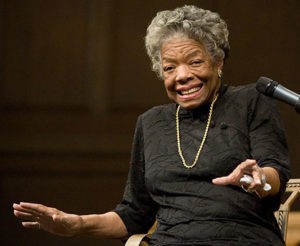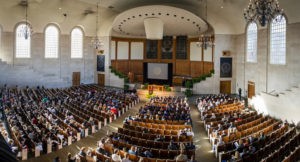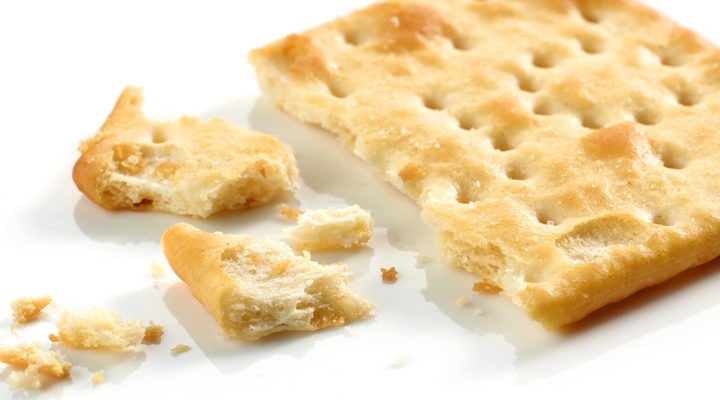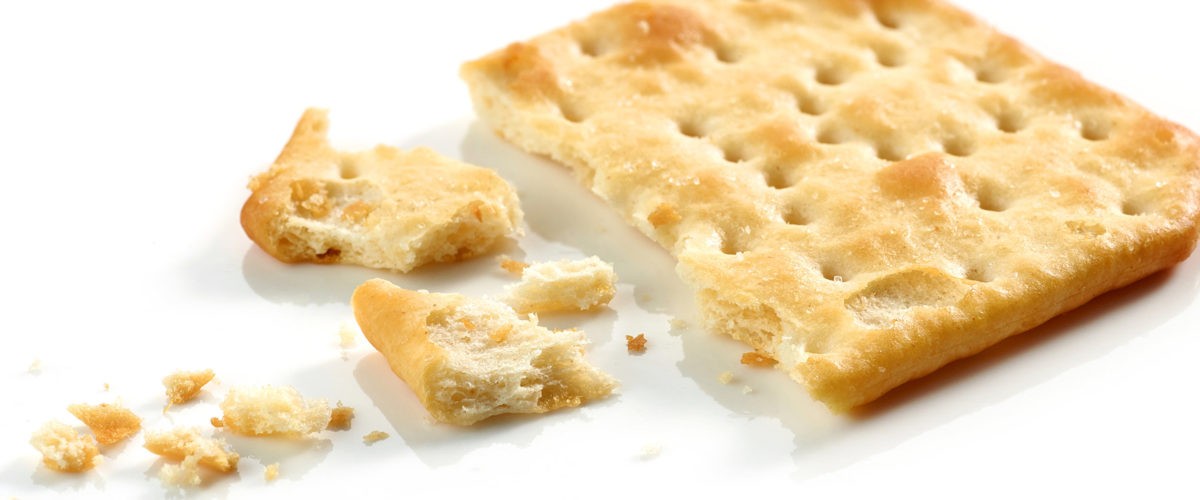On Tuesday, Sept.18, 2001, poet/prophet/writer Maya Angelou, professor of humanities at Wake Forest University, spoke to students and faculty at the Wake Forest School of Divinity. We had scheduled her visit months before, never knowing that it would occur exactly one week after terrorists used commercial airliners to bring down the Twin Towers of the World Trade Center in New York City and strike at the Pentagon. Another flight apparently was intended for the White House but went down in Pennsylvania after passengers heroically revolted against their captors.
Like all other Americans, we were still in shock from the unthinkable tragedies that took the lives of 2,977 individuals, literally and figuratively tearing holes in the American landscape and psyche.
Professor Angelou’s long-anticipated lecture became for us a holy moment. She was in New York that fateful day, she told us, in the small apartment she kept there, so she made a pot of soup to serve the little army of friends who sought sanctuary with her, clinging to one another as the world around them collapsed.

Maya Angelou (Photo: Wake Forest University)
She spoke to us of terrorism’s long history in the Holocaust, the Middle Passage of slave ships, the lynching trees of the Jim Crow South, and the massacres of innocents in assorted global and national injustices, citing novelist and friend James Baldwin who, she said, searched for hope amid the abiding reality of human evil.
I took notes on her remarks in a well-worn copy of her classic book, I Know Why the Caged Bird Sings, that my spouse and Wake Forest professor, Candyce Crew Leonard, bought at a yard sale in Louisville, Ky., in the 1970s. The author signed it in 2002; it remains a sacred text in our home.
With characteristic insight, Angelou concluded her remarks to the divinity school by asserting that the terrible events of 9/11 required “unanticipated courage” of us — courage that lurks deep within the human heart, often unrecognized, unleashed in times of unforeseen tragedy.
As the 20th anniversary of 9/11 drew near, I returned to Angelou’s words and the memory of that day at Wake Forest. For us, the 20th year since 9/11 occurs amid assorted national crises, including COVID, climate, immigration, voting rights, and the rapid decline of religious engagement throughout the U.S. At such a time, where might unanticipated courage find us, or where might we find unanticipated courage? My reflections include:
“Sometimes I come to church with hardly an ounce of courage, when life has emptied me of faith, hope and love.”
Sometimes unanticipated courage finds us in the community of faith, times when we need others to believe for and with us. Sometimes I come to church with hardly an ounce of courage, when life has emptied me of faith, hope and love. But I show up in church by habit, guilt or need, and suddenly we start singing “Spirit of the living God, fall fresh on me,” and I find courage one more day, not because of my faith, but because of the faith manifested in Christ’s Beloved Community.
Haven’t we all been carried by the courage of others when we could not get there ourselves? How many holy women and men have encouraged us when we had almost none at all? Most of us may never know when our little bit mediated through the gathered community (yes, even online) is enough to sustain somebody another day, when our collective affirmation of faith strengthens those who fear faith is nowhere to be found.

Wait Chapel at Wake Forest
Sometimes we experience unanticipated courage through memory. Memory can bring courage that strengthens us here and now. Sept. 11, 2001, came on a Tuesday, the day the School of Divinity at Wake Forest gathered for its weekly 11:00 chapel service. Two Baptist women, Reverends Nancy Sehested and Lynda Weaver Williams, were leading chapel that morning. With the news of the Twin Towers, they changed their earlier plans, calling us to a service of Scripture and prayer. Word of that service apparently swept the campus, and the small chapel overflowed with undergraduates who sought a place to pray.
As the service was ending, I got up to give the benediction and suddenly heard myself announcing that there would be a service of Holy Communion that afternoon in Wait Chapel, the largest gathering place on campus. Ministers from the Divinity School, the Religion Department, and the chaplain’s office came together to administer Communion. To our surprise, some 800 people, mostly students, showed up. Staggered by the news, they grasped for sacred space to help them comprehend the moment.
“Standing at the Communion table, she took large sheets of matzo bread, Passover unleavened crackers, crushing them in her hands, and repeating the word ‘broken’ as the fragments flew across altar and floor.”
At Communion, the preacher was School of Divinity professor Jill Crainshaw. While I remember few of her words, I cannot forget the visual power of her ritual actions. Standing at the Communion table, she took large sheets of matzo bread, Passover unleavened crackers, crushing them in her hands, and repeating the word “broken” as the fragments flew across altar and floor. It is an image etched forever on my memory.
Crainshaw led us to that table covered in broken bread, with the memory of Jesus’ own words of body and blood, life and death, and the invitation to come forward for Communion by intinction. And they came.
Our words to those 800-plus people still sound in my memory: “The body and blood of Christ keep you to everlasting life,” a sign of hope and courage in an overwhelmingly frightening moment. Twenty years later, the memory of that moment brings courage to me yet, a collective confession that life is stronger than death, good greater than evil, and the presence of the living Christ in it all.
And sometimes unanticipated courage finds us when life overwhelms us, when fear is real, and by grace we find courage to respond. In a powerful passage from his book Stride Toward Freedom: The Montgomery Story, Martin Luther King Jr described such a terrible moment during the Montgomery Bus Boycott in 1956. It began with a January late-night phone call and a threat: “If you aren’t out of town in three days, we’re going to blow your brains out and blow up your house.”
Says King:
I hung up but I could not sleep. It seemed that all my fears had come down on me at once. I had reached the separation point. I got out of bed and began to walk the floor. Finally I looked in the kitchen and heated up a pot of coffee. I was ready to give up. I tried to think of a way to move out of the picture without appearing a coward. In this state of exhaustion, with my courage all but gone, I decided to take my call to God. With my head in my hands, I bowed over the kitchen table and prayed aloud. The words I spoke to God that midnight are still vivid in my memory. “I am here taking a stand for what I believe is right. But now I am afraid. The people are looking to me for leadership, and if I stand before them without strength and courage, they too will falter. I am at the end of my powers. I have nothing left. I’ve come to the point where I can’t face it alone.” At that moment, I experienced the presence of the Divine as I had never experienced him before. It seemed as though I could hear the quiet assurance of an inner voice saying: “Stand up for righteousness, stand up for truth; and God will be at your side forever.” Almost at once my fears began to go. My uncertainty disappeared. I was ready to face anything.
Sometimes, like Martin Luther King, when we can’t find courage, courage finds us, and we stand with Jesus against the principalities and powers of body and soul that so easily beset us, discovering, by grace, the “unanticipated courage” to live, to love, to be, another day.

Bill Leonard
Bill Leonard is founding dean and the James and Marilyn Dunn professor of Baptist studies and church history emeritus at Wake Forest University School of Divinity in Winston-Salem, N.C. He is the author or editor of 25 books. A native Texan, he lives in Winston-Salem with his wife, Candyce, and their daughter, Stephanie.
Related articles:
Reflecting on the effects of 9/11 and the disarray of America foreign policy | Opinion by David Gushee
9/11 was a day of dark despair and multicultural unity
9/11 at 20: The ongoing choice between fear and love | Opinion by Erich Bridges


